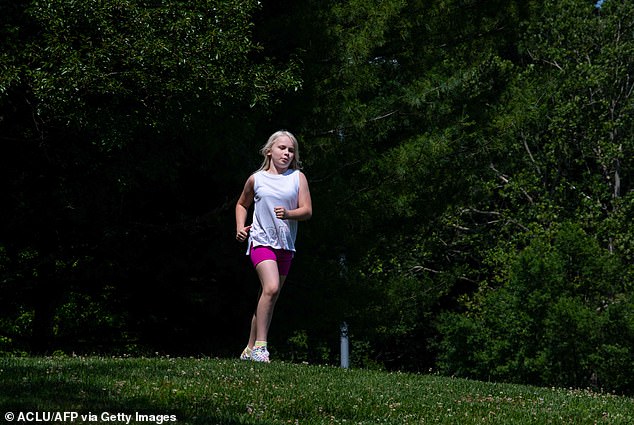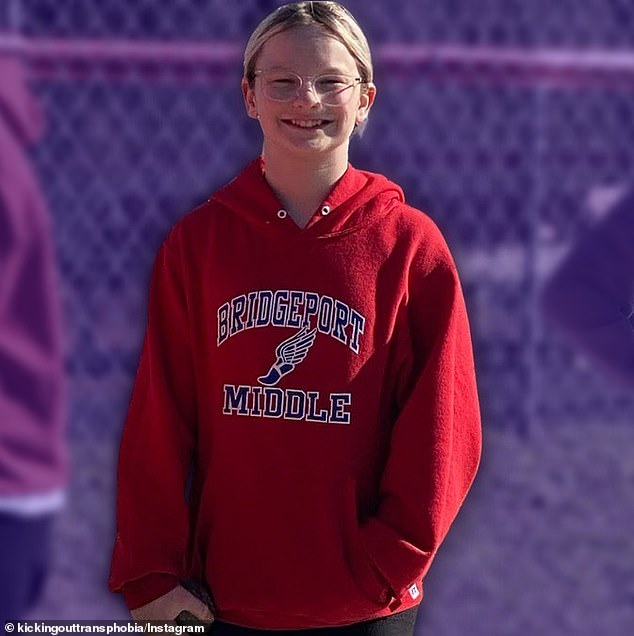Trans athlete wins shot-put by more than THREE FEET as middle school girls stage ‘step out’ protest and refuse to compete against her – days after she won court battle to overturn West Virginia transgender laws
A transgender athlete from West Virginia won her shot put competition in her first sporting event after an appeals court ruling allowed her to compete — because other competitors refused to play against her.
Becky Pepper-Jackson, 13, competed in the Harris County Middle School Track and Field Championship on Thursday, two days after a court ruled that West Virginia’s transgender sports ban violates the teen’s rights under Title IX.
Pepper-Jackson took first place in the shot put event with her 10-meter effort, one meter ahead of second place, and she placed second in the discus.
Despite being legally allowed to compete, some athletes protested Pepper-Jackson’s participation by refusing to play against her.
Five girls from Lincoln Middle School came to the circle for their turn and then refused to throw the ball.
Becky Pepper-Jackson (pictured), 13, won her shot put competition in her first sporting event after an appeal court ruling allowed her to compete


Despite being legally allowed to compete, some athletes protested Pepper-Jackson’s participation by refusing to play against her. Pictured: Five girls from Lincoln Middle School came to the circle out of turn and then refused to throw the ball
The event scores on Athletic.net show that the athletes were marked ‘no distance’.
Riley Gaines tweeted a video of the protest, saying, “It’s a sad day when 13-14 year old girls have to be the adults in the room, but I couldn’t be more inspired and proud of these girls.”
Pepper-Jackson won her years-long battle to compete in the sport since West Virginia Governor Jim Justice banned transgender athletes from competing in middle school, high school and college in May 2021.
On Tuesday, the 4th U.S. Circuit Court of Appeals ruled that the ban cannot be applied to 13-year-olds.
The court previously blocked the state’s attempt to kick the teen from her high school cross country and track teams in February 2023.
Tuesday’s decision does not overturn the ban, as it only applies to Pepper-Jackson’s case, but the law could fall into limbo if other transgender student-athletes choose to challenge it.
The court noted that Pepper-Jackson has been living as a girl for more than five years. She began identifying as a woman in third grade and has competed exclusively on girls’ sports teams.
In addition to taking puberty blockers and estrogen hormone therapy, the student legally changed her name and the state of West Virginia issued her a birth certificate listing her as female.

Pepper-Jackson won her years-long battle to compete in the sport since West Virginia Governor Jim Justice banned transgender athletes from playing in May 2021

In addition to taking puberty blockers and estrogen hormone therapy, Pepper-Jackson has legally changed her name and has a birth certificate that lists her as female.

The court noted that Pepper-Jackson had lived as a girl for more than five years and began identifying as a woman in third grade
Offering the teenager a “choice” between not playing sports or only participating in boys’ teams “is not a real choice at all,” judge Toby Heytens wrote in the ruling.
“Defendants cannot expect that BPJ will thwart her social transition, her medical treatment, and all the work she has done with her schools, teachers, and coaches for nearly half her life by introducing herself to teammates, coaches, and even opponents like a boy’, Heytens wrote.
In a statement, ACLU West Virginia attorney Josh Block called the ruling a “huge victory.”
After the decision, West Virginia Attorney General Patrick Morrisey said he was “deeply disappointed” and vowed to keep fighting to secure Title IX.
“The law was passed more than fifty years ago and was intended to address sex discrimination in education by ensuring that women had equal opportunities to participate in federally funded programs.”
“We must continue to work to protect women’s sports so that women are kept safe and girls have a truly level playing field,” Morrisey said Tuesday. “We know the law is correct and will use every tool available to defend it.”
In the ruling, the appeals court reaffirmed that government officials had the authority to create separate sports teams for boys and girls and enforce the boundary between them.
“We also do not believe that Title IX requires schools to allow any transgender girl to play on girls’ teams, regardless of whether they have gone through puberty and experienced elevated circulating testosterone levels,” the court stated.
“We merely believe that the district court erred in granting these defendants’ motions for summary judgment in this specific case and in failing to grant BPJ summary judgment on its specific Title IX claim.”
In a dissent, Judge G. Steven Agee wrote that the state can segregate teams based on gender assigned at birth “without running afoul of the Equal Protection Clause or Title IX.”

Offering the teenager a “choice” between not playing sports or only participating in boys’ teams “is not a real choice at all,” judge Toby Heytens wrote in the ruling.

Pepper-Jackson told NBC News in October that she would not give up her fight to compete in girls’ sports
West Virginia is one of 24 states that ban transgender women and girls from participating in sports consistent with their gender identity.
Pepper-Jackson told NBC News in October that she would not give up her fight to compete in girls’ sports.
“I want to keep going because this is something I love to do, and I’m not going to just give it up,” she said. “This is something I really love, and I’m not going to give up on anything.”
Her mother, Heather Pepper-Jackson, said, “She likes to do the best in everything, whether it’s algebra, running, shot put or discus.”
“She tries to excel in everything she does, just like any other kid… if she doesn’t go into battle, who will?”
